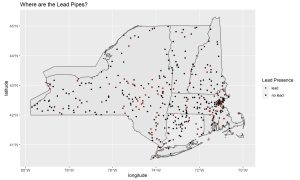This summer, we worked with Professor Frye and Professor Kagy to research the economic consequences of childhood exposure to environmental toxins. We primarily focused on evaluating whether early exposure to lead would cause differences in intergenerational mobility, occupational rank, and total years of schooling.
The project involved constructing a highly intricate data set that pulled together information on people and towns in the northeast, where the integration of central water systems was prevalent around the turn of the twentieth century and the use of lead and non-lead materials for the municipal pipes varied. We used IPUMS to collect census data for the late nineteenth and early twentieth centuries, the Census Linking Project to probabilistically match people across censuses, the Census Place Project to identify where these people lived, and two books that organized information on cities’ water systems and water chemistry.
Due to the large sizes of the data, we relied on Amazon’s Web Server to run code in RStudio that could compile and build our data set. Our final data set allowed us to identify children in the Northeast as living in either lead or non-lead cities, and then track this cohort overtime to evaluate their outcomes in adulthood.
Exploratory data analysis, involving graphs, maps and summary statistics tables, shows early implications that exposure to lead in childhood does have negative long-term economic consequences. For example, the average income in 1940 for a child exposed to lead in 1900 was $6062 less than the average for a child who was not exposed to lead via city service pipes.

Figure 1: This map visualizes where lead pipes were located in Maine, Rhode Island, New Hampshire, Massachusetts., Pennsylvania and New York.
This project also sparked an interest in current-day exposure to toxins and made us more cautious about what we may be consuming in our day-to-day lives. Moreover, this project was a very rewarding experience that enabled us to greatly improve our coding skills and collaborate with our professors, who offered deep insights into working in research. We are grateful that we had this opportunity to learn first-hand about economic research and be part of an exciting and innovative project.
